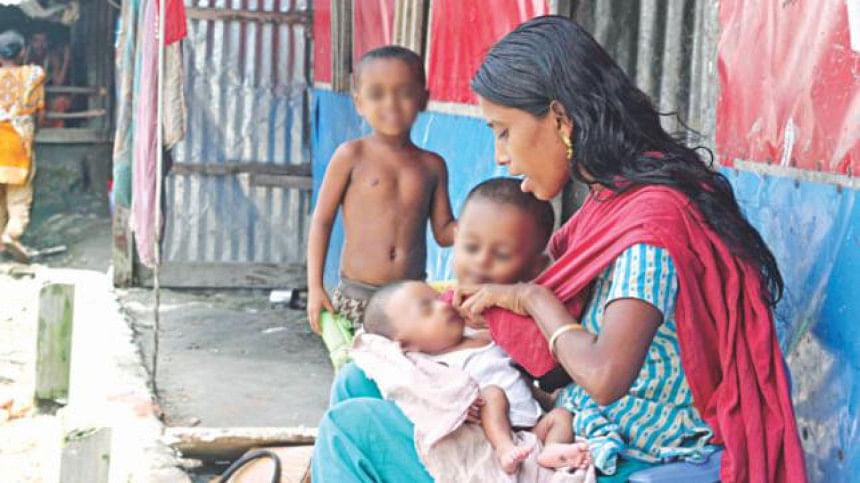Maternal health at risk amid threats of funding cuts

Although Bangladesh has achieved a remarkable reduction in its maternal mortality rate, this progress could be jeopardised by current and potential funding cuts from key development partners, according to a new UN report.
The report warns that funding cuts may lead to decreased functionality of healthcare facilities, loss of healthcare professionals, and disruptions in essential supply chains -- ultimately undermining the availability and quality of maternal care.
Despite the country's significant strides, marginalised groups remain vulnerable. Education, ethnicity, gender, income, and access to sexual and reproductive health (SRH) services are key to maternal health outcomes.
"Reduced funding could worsen inequalities and disproportionately impact the most vulnerable women," the report said.
Launched on World Health Day on Monday, the UN global report titled "Trends in Maternal Mortality" highlights worldwide progress in reducing maternal deaths, according to a joint press release from the World Health Organization (WHO), Unicef and UNFPA.
Stanley Gwavuya, OIC representative to Unicef Bangladesh, attributed the country's maternal mortality reduction to government efforts in improving women's economic and educational status, enhancing emergency care, increasing skilled birth attendance, expanding family planning, and strengthening the community health worker network.
"Moreover, the dedicated efforts and support of our development partners have been crucial to all these initiatives," said Gwavuya.
"A continued decline in this support could severely hinder Bangladesh's ability to maintain its momentum and meet Sustainable Development Goal targets. Therefore, government budget allocations must sustain these gains while focusing on strengthening the health system, ensuring out-of-pocket expenses don't prevent vulnerable mothers from accessing the care they need," he added.
While the report shows a 40 percent global decline in maternal deaths from 2000 to 2023, Bangladesh surpassed this with a striking 79 percent reduction in its maternal mortality ratio (MMR).
This translates to a drop from 523 to 115 deaths per 100,000 live births over the period -- amounting to approximately 4,000 maternal deaths in 2023. The country's average annual rate of reduction (AAR) stood at 7 percent from 2000 to 2023, reflecting sustained improvements in access to essential health services.
"However, echoing global concerns in the UN report, Bangladesh's progress is now at risk," the press release emphasised.
Ahmed Jamsheed Mohamed, WHO Representative to Bangladesh, said, "We've made significant strides in expanding maternal health services, but inequities persist -- especially among women in remote, rural, and low-income communities."
"We must act swiftly to ensure every woman, regardless of where she lives, has access to the life-saving care she needs during pregnancy and childbirth," he said.
The WHO remains committed to supporting Bangladesh in strengthening its health systems, investing in the healthcare workforce, and addressing underlying risks to women's health, he added.
"Eliminating preventable maternal deaths demands solidarity, investment, and sustained action," he said.
The leading causes of maternal death in Bangladesh include obstetric haemorrhage, hypertensive disorders, unsafe abortions, and other indirect complications.
Compounding these risks, Bangladesh has one of the highest rates of out-of-pocket health spending globally -- accounting for 74 percent of total health expenditure.
This burden pushes around five million people into poverty each year, leaving many expectant mothers without the resources to meet their health needs.
To address this, UNICEF, UNFPA and WHO stress the importance of strong health systems, including well-equipped facilities, a skilled healthcare workforce, and reliable access to life-saving medicines, diagnostic tools, and supplies.
"As Bangladesh celebrates its progress in maternal health, the looming threat of funding cuts highlights the fragility of these gains," the release said.
Sustained commitment from national and international development partners is essential to protect the lives of pregnant women and ensure continued progress toward ending preventable maternal deaths, it added.
"Bangladesh has achieved an extraordinary 79% reduction in maternal mortality since 2000. We're proud that this achievement has received international recognition, with Bangladesh having been chosen, in the new 'Midwifery Accelerator' initiative, launched this week during the 58th Session of the Commission on Population and Development (CPD58), as one of six champion-countries for implementation of the midwifery model of care ", said Masaki Watabe, UNFPA representative in Bangladesh.
"This achievement clearly demonstrates the power of investing strategically in midwives, who provide comprehensive sexual and reproductive health services, including maternal healthcare across the country," he continued. "With the Government's leadership and the support of development partners, Bangladesh has trained and deployed thousands of professional midwives who are delivering life-saving maternity care, especially in rural and hard-to-reach communities, as well as in humanitarian settings, such as for Rohingya refugees. Midwives can avert two-thirds of maternal and newborn deaths and stillbirths."
"Given current global funding challenges that risk stalling progress, it is crucial to protect and increase investments in midwifery and sexual and reproductive healthcare, especially in primary health facilities, to ensure every woman has access to the quality care from a midwife that she needs and deserves", Masaki added.

 For all latest news, follow The Daily Star's Google News channel.
For all latest news, follow The Daily Star's Google News channel. 



Comments